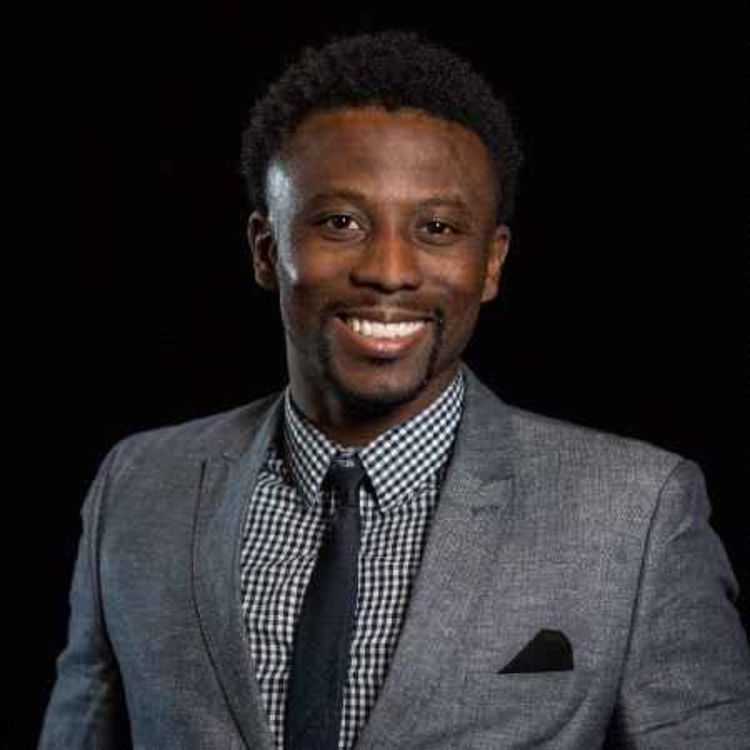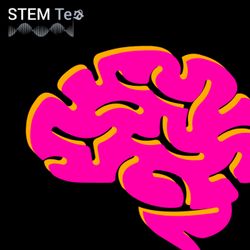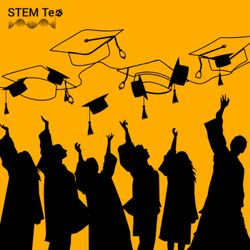Share

STEM Tea
From prison cells to PhD with Stanley Andrisse
In this episode of STEM Tea, AJ talks to Stanley Andrisse, Assistant Professor at Howard University (DC, USA) and Executive Director of the nonprofit From Prison Cells to PhD, whose mission is, "to reach, touch, and change the lives of individuals with disadvantaged backgrounds through advocacy, mentoring, and policy change."
Stanley's drive to help people from disadvantaged backgrounds and those who have been incarcerated transition into professional careers, is matched only by his passion for endocrinology research. Hear AJ and Stanley discuss his story, from his latest publication on polycystic ovary syndrome (PCOS) and non-alcoholic fatty liver disease in black women, his work to understand the pathways that lead to insulin resistance, the intergenerational impact of incarceration and mentoring practices.
You can also get an insight into his recently published book, From Prison Cells to PhD: It is Never Too Late to Do Good, and find out how scientists and the general public can do more to support the people Stanley helps.
Contents:- Introduction: 00:00-01:35
- Introducing STEMTea guest, Stanley Andrisse: 1:33-03:05
- Understanding mechanisms of insulin resistance: 03:05-05:20
- PCOS and non-alcoholic fatty liver disease in Black women: 05:20-07:05
- Good mentoring practices and inspirations: 07:05-09:40
- Examples of mentoring improving critical thinking and relationships with failure: 09:40-11:30
- Developing a mentoring relationship: 11:30-16:30
- Life experiences that improve mentoring capabilities: 16:30-21:50
- The Endocrine Society and two recent publications: 22:45-28:50
- Pell Grants and their inaccessibility to the incarcerated: 28:50-34:00
- NSF grant and STEM Ops: 34:00-38:15
- Incarceration, higher education, family structure and intergenerational impacts of both: 38:15-44:20
- The 1619 Project by Nikole Hannah-Jones and From Prison Cells to PhD by Stanley Andrisse 44:20-49:30
- Takeaways and conclusions 49:30-51:30
- Ways scientists can support From Prison Cell to PhD 51:30-52:25
- What’s the tea? 52:25-54:47
More episodes
View all episodes

9. STEM Tea | Humans first, professionals second
47:52||Season 3, Ep. 9In this episode of the STEM Tea podcast, host AJ Hinton is joined by Lindsey Keith-Vincent, Associate Dean for Research, Outreach and Innovation at Louisiana Tech University (LA, USA). Lindsey is a first-generation college graduate who originally trained as a high school teacher before moving into STEM. In this episode, Lindsey talks about where she learned her most valuable leadership lessons and why she considers her personal relationships to have transformed her career. She also shares her model for encouraging education at a young age and how she supports her faculty to help them perform at their best. Contents: ● Meet Lindsey: 00:47–05:27● The difference a Dean can make: 05:28–08:47● Supporting your faculty to support your higher-education students: 08:48–15:40● Facilitating connections in impactful mentorship: 15:41–23:05● The power of personal relationships in your professional career: 23:06–32:38● Championing openness and authenticity in leadership: 32:39–36:32● Providing holistic support to help people help their community: 36:33–40:09● How we can support our children to encourage future success: 40:10–46:55
8. STEM Tea | Investing in our students
36:27||Season 3, Ep. 8In this episode of the STEM Tea podcast, host AJ Hinton is joined by two science educators who are striving to instill a love of science and a sense of belonging within K–12 students through outreach initiatives and programs.Yelena Janumyan is a postdoctoral fellow at the Collaborative for STEM Education and Outreach at Vanderbilt University (TN, USA). Since receiving her PhD, Yelena has taught science and math in schools; however, she is now turning her attention back to research.At the time of recording, Zachary Conley was also a postdoctoral fellow at the Collaborative for STEM Education and Outreach at Vanderbilt University. Before joining the Collaborative, he was working toward his PhD in biochemistry and molecular biology from the Baylor College of Medicine (TX, USA).At the Collaborative, Yelena and Zachary were co-instructors for the Day of Discovery Program, an initiative for middle school students to participate in a research-based STEM curriculum one school day per week.Content:Introductions: 00:00–02:39More about the Collaborative for STEM Education and Outreach and their Day of Discovery initiative: 02:40–05:27Why should we care about this initiative? 05:28–07:45How do your science classes differ from standard classes? 07:46–09:34How does this program support and inspire students? Plus, personal motivations for instructing this program: 09:35–12:46Expanding the horizon of career prospects, belonging and scientific exploration: 12:47–18:15Navigating STEM careers, from mentors to research: 18:16–22:36A lesson in leadership: 22:37–24:15How can we improve education for all? 24:16–29:52How can scientists and teachers work together to improve STEM education? 29:53–32:27Closing thoughts: 32:28–36:27
7. STEM Tea | Being visible as an act of service
56:45||Season 3, Ep. 7In this episode of the STEM Tea podcast, host AJ Hinton is joined by Ulises Ricoy, who was the Director of Outreach Initiatives at the University of Arizona (AZ, USA) at the time of this recording. Ulises has championed low-cost approaches to basic neuroscience research as well as educated underrepresented groups in STEM academia.Ulises shares his journey to STEM, including how he developed his research and the value of diverse perspectives within that research. He also shares why not everyone is cut out to be a mentor and where to start with tackling representation in academia.Since the recording, Ulises has pursued other opportunities outside of academia.Contents:Meet Ulises and what drives his research 00:55–23:41Why encouraging professional–personal balance can support diverse recruitment 23:42–43:00What makes a mentor 43:01–55:38Closing 55:39–56:46
6. STEM Tea | Founding Black in Neuro
40:57||Season 3, Ep. 6In this episode of the STEM Tea podcast, host AJ Hinton is joined by Brielle Ferguson, Assistant Professor in Genetics and Neurology at Harvard (MA, USA), and Angeline J. Dukes, Assistant Professor in the Department of Neuroscience at the University of Minnesota (MN, USA). Brielle is a researcher studying the biomarkers of cognitive dysfunction and Angeline shares her time between teaching and leading DEI initiatives at the University of Minnesota.Brielle and Angeline share why visibility is so important in representation and the valuable lessons they’ve learned about being a mentee and a mentor. They also discuss their journey towards launching Black in Neuro and what unmet needs remain.Contents:Meet Brielle Ferguson 01:00–02:04Meet Angeline J. Dukes 02:05–03:14Welcoming – and retaining – under-represented groups on campus 03:15–07:47Prioritizing yourself to push for progress 07:48–12:56The power of visibility in enabling authenticity 12:57–18:57Why mentorship is a must, and the mentors who made a difference for Brielle and Angeline 18:58–27:08The genesis and goals of Black in Neuro 27:09–34:28Building community and addressing funding disparity 34:29–39:15
5. STEM Tea | Disrupting racism and cisheteropatriarchy through research, pedagogy and mentorship in STEM education
40:43||Season 3, Ep. 5In this episode of the STEM Tea podcast, host AJ Hinton is joined by Luis A. Leyva, Associate Professor of Mathematics Education & STEM Higher Education in the Peabody College of Education & Human Development at Vanderbilt University (TN, USA). Luis is the Director of the Power, Resistance & Identity in STEM Education (PRISM) Research Lab. He describes how his research examines equity through pedagogy to disrupt racism and cisheteropatriarchy for broadening opportunities among historically marginalized populations in STEM.Luis discusses why amplifying marginalized experiences as knowledge sources is vital to challenge the status quo in STEM pedagogy, in addition to his perspectives about leadership as a researcher. He also shares his experiences of being an openly queer man of color as a form of resistance and the ethos of his equity-minded mentorship in the academy.Contents:Meet Luis 00:41–02:54The evolving definition of ‘STEM’ and variation of disciplinary cultures in the sciences 02:55–04:48Expanding opportunities for historically marginalized groups in STEM through pedagogy 04:49–07:35A glimpse into pedagogy in postsecondary calculus for STEM educational equity 07:36-12:25Sustaining professional energy by nurturing aspects of personal life 12:26–16:30The leadership challenges of making space for multiple voices whilst maintaining a collective vision 16:31–22:04Passion for amplifying and validating experiences of intersectionality to foster a sense of belonging in STEM 22:05–25:25Learning and growing alongside research mentees in equity-minded advising 25:26–29:54Being out as a form of resistance, especially in STEM environments 29:55–33:13Mentorship: paying it forward, facilitating connections and embracing equity 33:14–39:16Closing 39:17–40:37Relevant publications:Racially-affirming community in instructional servingness for Latin* students’ gateway mathematics classroom participationThe rights of undergraduate queer and trans* students of color as STEM majors“It seems like they purposefully try to make as many kids drop”: An analysis of logics and mechanisms of racial-gendered inequality in introductory mathematics instruction
4. STEM Tea | Strengthening HBCUs
01:00:49||Season 3, Ep. 4In this episode of the STEM Tea podcast, host AJ Hinton is joined by Haysetta Shuler, an academic consultant in industrial–organizational psychology (I–O psychology) and a DEI mentor. Haysetta is an experienced administrator at a Historically Black College and University (HBCU), and she is passionate about increasing the involvement of Black students in STEM.Haysetta discusses the value of I–O psychology and how students at HBCUs can be supported with hands-on experience, mentorship and network building. She also shares her tips for choosing a mentor or mentee and the value of saying less and listening more.Contents:Meet Haysetta 00:55–04:36Spotting, seizing and maximizing opportunities 04:37–08:27Generating evidence on the positive impacts of improving work–life balance 08:28–13:12Preparing students at HBCUs for their next steps through Project Strengthen 13:13–24:37The impact and remaining need for HBCUs 24:38–31:41Engaging students and their families to secure the Black STEM pipeline 31:42–35:59Being led by student needs when developing programs 36:00–40:03Building a strong, sustainable and effective mentor–mentee relationship 40:04–47:07What the future holds for STEM, I–O psychology and Project Strengthen 47:08–58:09
3. STEM Tea | Working together for better science and better opportunities
45:23||Season 3, Ep. 3In this episode of the STEM Tea podcast, host AJ Hinton is joined by Corey Reynolds, a Regional Medical Scientific Director in industry. Corey’s background ranges from academics to industry consulting; he applies these varied experiences to mentoring the next generation of Black scientists.In this episode, Corey explains his current role as a medical science liaison (MSL) and how it varies from his experiences in academia. He also discusses the crucial need for more Black scientists in every stage of the scientific process, from student labs to clinical trials.Contents:Meet Corey 00:56–05:50Understanding and securing a MSL role 05:51–09:11The differences between MSL and academic roles 09:12–12:36Dealing with uncertainty in an industry role 12:37–16:25Mentoring Black students at different institutions 16:26–19:19Black in Physiology as a place of sanctuary and mentorship 19:20–26:22The impact of winning awards 26:23–28:49Encouraging collaboration 28:50–32:29Corey’s life outside of work 32:30–33:53Reversing the downward trajectory of diversity in higher education 33:54–40:42Championing increased clinical trial diversity 40:43–44:24To learn more about Black in Physiology, listen to our podcast with founder Clintoria Williams.
2. STEM Tea | Impact and sustainability in mentorship
49:50||Season 3, Ep. 2In this episode of the STEM Tea podcast, host AJ Hinton is joined by Clintoria Williams, Principal Investigator in the Kidney PathoPhysiology Research Group at Wright State University (OH, USA). Clintoria is a physiologist who is passionate about ‘lifting while climbing’ and is a co-founder of Black in Physiology.In this episode, Clintoria shares her journey in mentorship, sharing her tips for balancing your professional and personal life, and turning every experience into an opportunity for learning. She also shares highlights from last year’s Black in Physiology Week, an online and community event that celebrates achievements, and provides resources and support.Contents:Meet Clintoria Williams and her research: 0:00–2:02Promoting equity and inclusion in your space: 2:03–5:35Getting the most out of mentoring for both mentors and mentees: 5:36–9:10Balancing professional and personal commitments: 9:11–14:50The birth and growth of Black in Physiology: 14:51–21:40Championing Generation Now and preparing Generation Next: 21:41–26:16Taking time to celebrate your strengths and turn weaknesses into opportunities: 26:17–28:43Leading with the ‘why’ in research and communication: 28:44–31:08Her journey towards being a mentor and a leader: 31:09–35:34The power of bringing your true self everywhere you go: 35:35–38:00Highlights from the most recent Black in Physiology Week and what’s to come in the future: 38:01–42:59What’s next for Clintoria and her team of Zinc-sperts? 43:00–46:33Clintoria’s advice for her younger self: 46:34–47:46Wine recommendations to stay fearless from Clintoria and AJ: 47:47–49:50
1. STEM Tea | Supporting underserved communities through STEM mentorship
57:32||Season 3, Ep. 1In this episode of the STEM Tea podcast, host AJ Hinton is joined by Alberto “Beto” Vasquez, Director of STEM Engagement & Community Relations for the Center for Research in Education & Teaching Excellence (CREATE) at University of California, San Diego (CA, USA). Beto is a biologist, educator and community leader applying his colorful lived experience to support students from similar backgrounds and communities.At CREATE, he spearheads efforts to increase access, engagement and interest in STEM fields to communities throughout Southern California. In this episode, he offers advice for students to look beyond the mirror to find a mentor, how to advance passion and purpose by building strong relationships and why you should consider ‘different normals’.Contents:Meet Beto: 0:38–04:33What is the CREATE Program? 04:34–9:33Planning the programs and supporting communities with different normals: 9:34–14:14The impact of holistic applications in uncovering hidden STEM talent: 14:15–21:38Balancing work and family to remain authentic to yourself: 21:39–27:52Building your ecosystem through mutual support: 27:53–35:36Evolving a narrow view of mentorship towards true equity: 35:37–48:27Beto’s advice for service, mentorship and leadership: 48:28–57:32